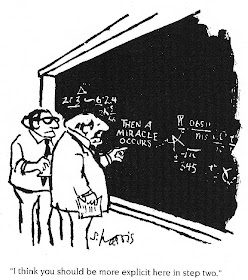We tend to ignore the subtleties, inconsistencies, and complexities of our existence and to think in terms of simple, mutually exclusive dichotomies:
Funny vs. not Funny
The allure of this way of thinking is simplicity...
The tendency to think about the true nature of humor in terms of dichotomies is illustrated by two kinds of questions that people commonly ask about expressed humor (comedy):
(1) Is it physiological, or is it psychological?
(2) Is it inherited, or is it learned?
Both questions have proved to be misguided attempts;
yet they are among the most common kinds of questions asked in humor studies. That is why I am dwelling on them here.
(C) Joseph-Nicolas Robert-Fleury
Galileo before the Holy Office.
One-two punch!
The idea that human processes fall into one of two categories, physiological or psychological, grew out of a 17th-century conflict between science and the Roman Church.
Humor, in the form of epigrams and inscriptions, dates back to the funeral mounts during the classical and Hellenistic epoch of ancient Greece when funerals included joyful elements such as games, competitions, dancing, and acts intended to recreate life and restore balance to the earth in response to a belief that nature was dying.
Norwich Cathedral
In the right corner, we have Descartes (1596-1650) weighing in on the side of science
In the left corner, we had the Roman church,
then people started mixing things up and eventually, we found the Matrix...
and the dogmas protested
and some of us laughed
because it was that simple...















No comments:
Post a Comment